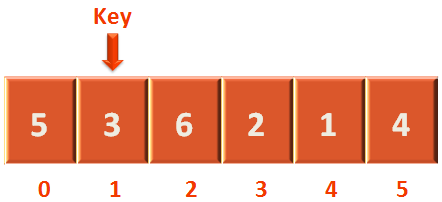

package main
import "fmt"
func insertionSort(arr []int) {
n := len(arr)
for i := 1; i < n; i++ {
key := arr[i]
j := i-1
for j >= 0 && arr[j] > key {
arr[j+1] = arr[j]
j--
}
arr[j+1] = key
}
}
func main() {
arr := []int{5, 3, 6, 2, 1, 4}
insertionSort(arr)
for _, val := range arr {
fmt.Println(val)
}
}
We are just bothered about the func insertionSort(arr []int) method, where the sorting logic is defined.
We have the array
arr := []int{5, 3, 6, 2, 1, 4}Which we have passed to the insertionSort(..) method.
In the insertionSort(..) method, we have taken the count of the elements of the array.
n := len(arr)
Then, we are running a for loop which will iterate the array starting from the second element till the last element.
for i := 1; i < n; i++
And we are setting the 2nd element of the array as the key.
key := arr[i]
i.e. Content of arr[1] is the key initially. So, the value of key is 3.

Then we make the value of j as i-1.
j := i-1
That's because we need to compare the key (i.e. arr[1]) with the left hand side elements (i.e. arr[0], where the value of j is 0) of the key.
And that is where the inner for loop comes into picture. Which takes care of the comparison of the key with the left hand side of the array.
for j >= 0 && arr[j] > key {
arr[j+1] = arr[j]
j--
}The above for loop is quite self explanatory. Where, we are getting into the for loop if the key(i.e. value of arr[1] that is 3) is less than arr[j] (i.e. value of arr[0] that is 5).
And we are replacing the value of arr[j+1](i.e. arr[1]) with arr[j] (i.e. arr[0]).
arr[j+1] = arr[j]
Now, arr[1] contains 5. Also arr[0] contains 5, but arr[0] should be 3.

So, how the value of arr[0] is replaced by 3.
That happens when we get out of the loop, when the condition j>=0 is met by while loop.
And set the value of arr[0] with the key (i.e. 3).
arr[j+1] = key
Since, -1+1 is 0. So the above is arr[0] = key.
And finally, arr[0] is set to 3.

Similar, process follows for the entire loop.
If we consider the Insertion Sort Algorithm, there are two loops. First is the for loop. And inside the for loop there is another for loop.
The for loop executes n times(Assuming the array contains n elements).
Now, for each iteration of for loop, the while loop also executes n times in worst case.
Which means for 1st iteration of for loop,
inner for loop runs 1 time.Similarly, for 2nd iteration of for loop,
inner for loop runs 2 times.Similarly, for nth iteration of for loop,
inner for loop runs n times.So, the running time is close to n*n or n^2.
So, in worst case the running time is O(n^2).
And in best case the running time is O(n).